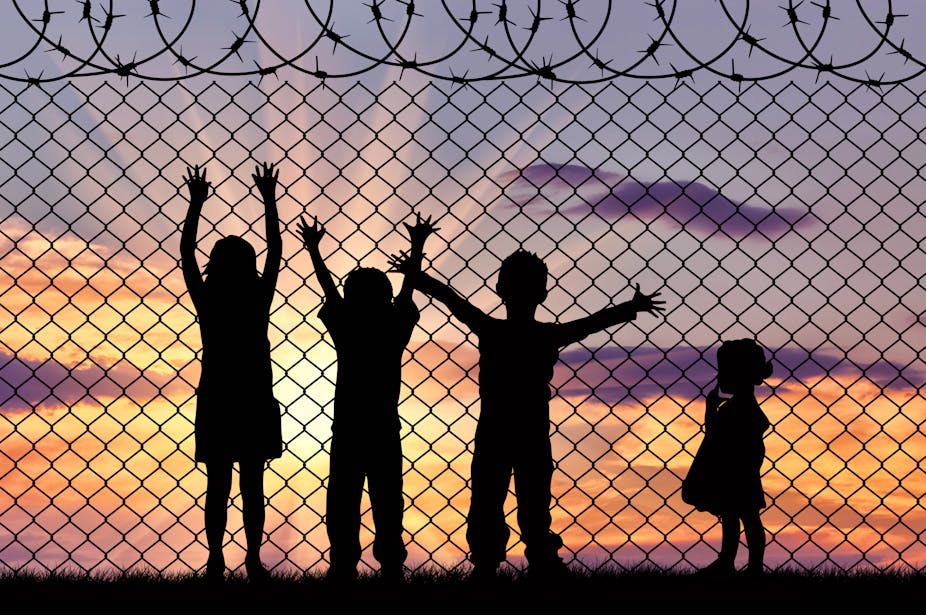Indonesia is a major refugee transit country in Southeast Asia. As of May 2023, Indonesia hosted at least 12,704 refugees, primarily from Afghanistan, Somalia, Myanmar, Iraq and Sudan. Almost 30% are children.
Most of them stay for more than four years in Indonesia without knowing when will the transit period will end. Considering the period of time that can be wasted, especially for refugee children, we argue that the refugee children need to access education while they are waiting. Regardless of their residential status, they have a fundamental right to education, to prepare them for their future and to provide a sense of normalcy and stability.
Prior to the pandemic, Indonesia had made progress in providing access to education for hundreds of refugee children. It allowed refugee children to attend Indonesian schools, as long as they had documentation from the UNHCR, an immigration detention centre and a letter of financial guarantee from a sponsoring institution, such as from the International Organisation for Migration (IOM).
However, our research conducted in the cities of Batam in Riau Islands province and Makassar in South Sulawesi province in June 2022 showed the pandemic has hindered this progress.
Our research
We collected our data through observations and in-depth interviews with six refugee parents from different nationalities (Afghanistan, Sudan, Sri Lanka, and Somalia) and five refugee children enrolled in primary and secondary schools.
We also interviewed principals and teachers of the schools, government officials at local and national levels and local United Nations officials.
We have found four problems hindering refugee children’s access to education.
1. Information sharing
“Before the government issued a circular letter, we thought public schools could only be accessed by Indonesian citizens, so we looked for private schools for the refugee children. After the presence of the circular letter, there is an opportunity for refugee children to enrol in public schools, and the process is quite fast,” a IOM Staff in Batam said during an online interview.
The Circular Letter is a letter from the Secretary General of the Ministry of Education, Culture, Research and Technology Number 752553/A.A4/HK/2019 dated on 10 July 2019 that enables access to education for refugee children in Indonesia.
However, poor communication between the central government, local authorities and schools prevents refugee children from enrolling the school despite the existence of the circular letter.
The central government relied on the local authorities to share information and strategies about the Circular Letter to the local education service providers.
But, the local authorities relied on international organisations, mainly the IOM, to bridge communication with and provide information to the refugee community, rather than proactively delivering such information themselves.
However, these international organisations websites mainly provide Jakarta-centric information, means that most of the information only covers Jakarta areas and is not helpful for refugees children based in other provinces in Indonesia. They also had limited financial capacities and had little capacity to provide assistance and communicate with refugee populations in person during the pandemic.
The poor coordination between the central government, local government and organisations like IOM led to locals schools hesitate to accept refugee children, refugee parents could not get schools information, and in the end, refugee children could not enrol.
2. Lack of technological access
To conduct remote learning during the pandemic, schools mostly used assignments and online classes. The assignment system needed contact via instant messaging apps (such as WhatsApp), whilst virtual classes used Zoom or Google Meet. This meant students needed access to the internet and a computer.
This was an issue for refugee children.
“Everything is becoming more expensive, but the allowance is the same and we cannot work,” said AJ, a refugee parent during our interview in Makassar.
While the Indonesian government provided free internet access for every Indonesian student, this did not apply to refugee children.
There were also language barriers between the teachers and students when communicating assignment through messaging apps.
3. Involvement of various stakeholders
If refugee children are going to be included in the Indonesian school system, many stakeholders need to be involved.
This includes the government authorities (particularly Ministry of Education), state authorities, schools and teachers, local education offices and international organisations
However, Indonesia still lacks a comprehensive and long-term regulatory framework to serve as a basis for partnerships involving different stakeholders.
This includes ways to overcome language barriers, low financial capabilities and a lack of technology tools that some refugee parents still found it difficult to support their children’s enrolment in Indonesian schools.
4. Motivation to go to school
Our research also found children’s motivation to go to school was a key factor.
There are two crucial factors that affect refugee children’s motivation: local students’ receptiveness and school teachers’ language ability.
Both factors must be present in the child’s learning to ensure the stability of the refugee children’s motivation.
In Batam and Makassar, many refugee children did not attend schools because their parents were afraid the school would not accept their children, who are already behind with learning, due to racial differences and language barriers.
They were also doubt about the long-term benefits of obtaining education with the Indonesian-specific compulsory subjects such as Pancasila and local arts that will not be used in third countries.
What to expect next
Looking ahead, we need to help schools welcome refugee students – and make refugee families aware of the support available.
National and local government also need to provide regulatory frameworks to enable refugee children’s access to educational services so that it aligns with Indonesia’s national interests and global commitments to refugees.
We also need international organisations to maintain their partnerships with the Indonesian government to bridge the communication gap on how to access education during their transit time in Indonesia.


